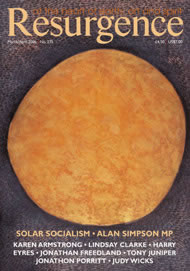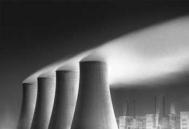WHEN GREEN ISSUES get onto the political agenda it is often the case that vested business or political interests seek to occupy the space they create. The companies promoting genetically modified crops, for example, sought to gain public consent and political backing for their products by hijacking people’s concerns over pesticides, disappearing wildlife and hunger. They said all of these challenges could be addressed with their products. The big issue now is climate change, and a different interest group has mobilised to make the most of the new opportunity: the nuclear industry.
The year 2006 sees the public debate really heating up. The pro-nuclear lobby has run an effective campaign of confusing the public to the point where many feel we have no alternative but to embrace nuclear in order to avoid the far more serious threat of climate change.
Rarely, however, has the nuclear debate examined basic questions. By what proportion can nuclear cut our greenhouse-gas emissions? How many stations will we need to do that? How much will it cost to build them? How long will it take? What else could we do with that time and money? Are we willing for all other countries to meet their climate change obligations with nuclear as well? People who ask these and other questions are sometimes dismissed as “ideologically opposed” to nuclear power.
Thus the backdrop to the current official UK consultation on energy policy and the possible future role for nuclear power has been established. This critical and controversial choice brings to mind the decision to invade Iraq. The conclusion that we would go to war was reached long before the public knew about it. While a political inner circle knew what was going to happen, public confusion was deliberately nurtured. At the same time scare stories about Saddam Hussein’s alleged stockpile of chemical weapons were promoted in the media.
In response to these reports, there were questions as to whether the decision had been taken to invade. Ministers insisted it had not, and said further intelligence-gathering was going on. Some of this was shared with the public – for example the ‘fact’ that Iraq could launch a chemical weapons attack that would leave the West with only forty-five minutes to respond. The intelligence-gathering eventually led to the compilation of what famously became known as the ‘Dodgy Dossier’.
The link with global terrorism was deliberately left hanging – the public were subtly encouraged to make that connection for themselves. And the link was easily made, as terrorism was what everyone was talking about. Thus it became easier for people speaking against the war to be portrayed as being against the ‘war on terror’.
SO IT GOES with nuclear. Carefully placed press reports, for example on the front page of The Times, apparently based on an exclusive interview with Prime Minister Tony Blair himself, set out why we need nuclear. Follow-up reports ask if a decision has already been taken. “No”, comes the answer; a consultation will be coming, ministers say. More stories come out – including scare stories about energy shortages. It is repeated that a consultation is launched that will look at all aspects of the issue. In due course comes one of the “difficult choices” that Blair says he must make (difficult in the sense that he has failed to convince people to back him).
The carefully conceived political decision-making process is supported by a media and political strategy implemented by the pro-nuclear interests who will build and operate the new stations. They have placed stories and promoted their ideas to opinion leader writers. Some of these commentators know as much about nuclear fusion, chain reactions and reprocessing as fish know about Plato. But the articles flow nonetheless.
Assuming for a moment that the energy minister is what he says he is – that is, “nuclear neutral” – and that the Prime Minister will take his neutral advice based on facts (despite the expensive pro-nuclear campaign), what are the issues that need to be factored into the decision if we are to build a truly sustainable energy policy? As far as the official consultation is concerned, there are, on the face of it, two questions being addressed. One is in relation to climate change and how we can make moves towards a low-carbon economy; the other is how we can gain secure supplies of energy into the future.
So how does nuclear pass muster on these? Well, for a start nuclear power is not carbon-neutral. The mining and refining of uranium from ore, the manufacture of fuel, the disposal of radioactive waste and the construction and decommissioning of stations all consume vast quantities of fossil power.
Then there is the scope of what it can do. Nuclear only provides electricity. It will do little or nothing to reduce emissions from other sectors – for example in relation to heating and transport. Even doubling our existing nuclear capacity would reduce our greenhouse-gas emissions by only 8%.
Also, remember that no-one has actually banned new nuclear build. No-one wants to build them because it would be financial madness. Huge costs and investment risk go hand in hand with nuclear power, and the nuclear lobbyists are looking for a multi-billion-pound hand-out to make their dying industry viable.
Of course, all energy sources receive official inducements – including renewable power. But would we get best value for our money with nuclear? The answer is “No”. There are much better things we can do. One US study found that a dollar invested in energy efficiency can achieve seven times more carbon reduction than a dollar spent on nuclear. We can only spend our money once – if it goes on nuclear, it can’t go on anything else.
In the US, as in the UK, vast subsidies have been plunged into nuclear stations. Indeed, the US has more nuclear stations than any other country – but it also has the highest per capita carbon-dioxide emissions. To put it mildly, nuclear power has some serious limitations when it comes to fighting climate change.
GETTING RENEWABLE ENERGY going, alongside more efficient energy use, making cars cleaner and getting traffic levels down, installing micro-power systems in buildings and making fossil generation cleaner and more efficient, is a better package. All this has a vital added benefit: we can start now. New nuclear power would not come on stream for at least fifteen years. By then it might not matter very much what we do about climate change. It might be too late.
Similarly, with issues of energy security, the role of nuclear has been overstated. Many newspaper articles and TV interviews have claimed that looming shortages of oil mean that we must go nuclear. Yet the vast bulk of our oil consumption is in transport, not electricity generation, and thus there is little nuclear power can do to ease this. The sensible solution to this challenge would be to encourage more walking and cycling, more local food supplies and more efficient vehicles, starting with hybrid technology that is available now. France, perhaps the most notable pro-nuclear country, has seen rising carbon-dioxide emissions and increased oil imports because it can do nothing to reduce oil dependence in transport.
When it comes to gas, it is often stated that we should not depend on far-flung supply countries as this makes us insecure. In reality, however, the bulk of our gas imports in the coming decades will be from Norway. Hardly an unfriendly or insecure country.
Perhaps the biggest contributions to energy security, however, can be found in efficiency gains. A recent European Commission study estimates that ‘no regrets’ energy savings of 40% are possible across the EU. ‘No regrets’ means we would not need to lower our levels of comfort, and would save billions of euros on our energy bills. Just changing old-fashioned energy-wasting light bulbs to the most efficient modern ones would cut out one nuclear power station. Fitting combined heat and power gas boilers in homes could do away with a couple more. Updating the electric motors that power industrial robots, conveyer belts and other machinery could save three more. The opportunity is massive - and we can start now.
And then there is the vast renewable power resource that lies all around us. We have barely started to exploit this. By the time new nuclear stations could come on stream in fifteen or more years time, who knows what kind of power sources we could have if we spent our money differently? Wind power is already making strides in efficiency as new turbine designs come into use. It is that technology that offers us real security.
The nuclear lobby has had a good start to its revival campaign. If there is a proper look at the real questions and honest answers provided through a genuinely neutral process, however, it will fail.
For further information, visit www.foe.co.uk.
If every household installed three
energy-efficient lightbulbs, enough energy would be saved in a year to supply all street lighting in the UK.
WWF, the global conservation organisation








